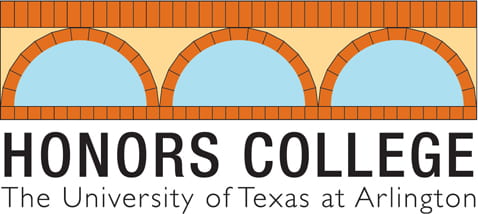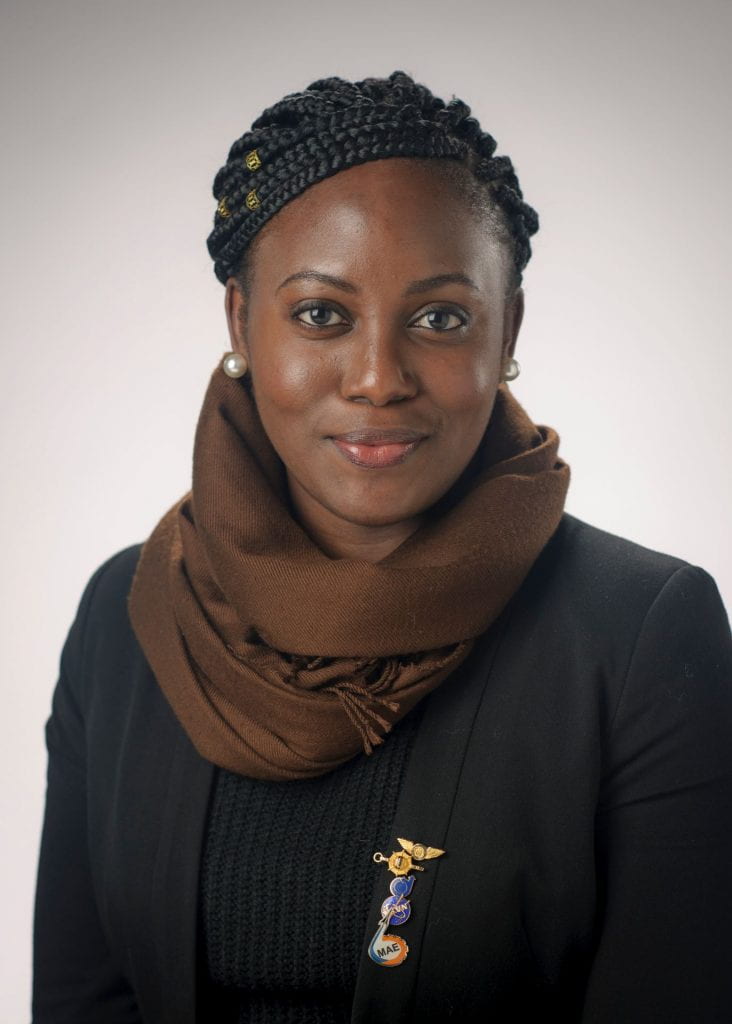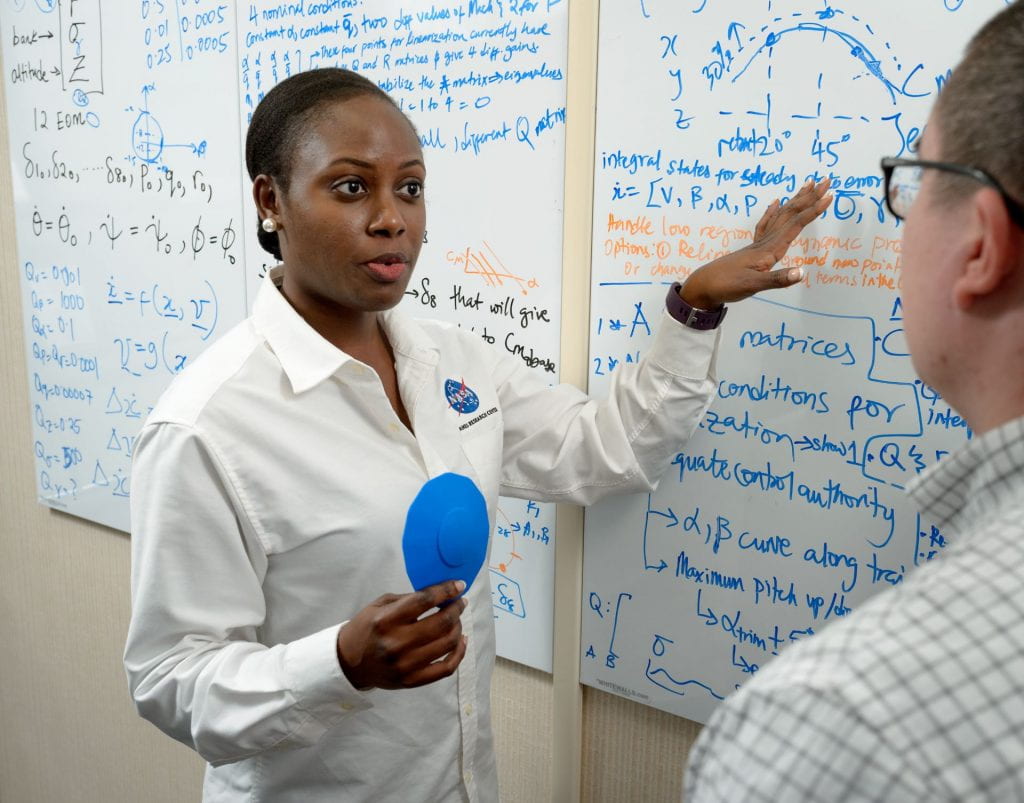Interview Conducted by Rebekah Chojnacki
Rebekah: Wendy, can you go ahead and give us your full name and your title?
Wendy: I am Dr. Wendy Okolo, and I am an aerospace research engineer at NASA Ames Research Center. In that role, I am the sub-project manager for an aeronautics project here called the System-Wide Safety Project, the controls lead for a space technology project Pterodactyl, and also the special emphasis programs manager for women here at Ames.
Rebekah: Thank you. Before you did that, you were at UT Arlington. Could you tell me a little bit about – I’d like to talk about Honors College, but a lot of the news articles have talked about you earning a Ph.D. and being the first black woman at UT Arlington to earn a Ph.D. in aerospace engineering if I have gotten that correct, is that true?
Wendy: Yes, I got my Ph.D. in aerospace at UT Arlington in 2015. But before that, I was there for undergraduate and got my undergraduate degree in 2010. And a little before I graduated, I think, Spring 2009, I was made aware of the BS to Ph.D. program that the College of Engineering was opening up. I believe, it was initially called the the Mav Grad Program. And I jumped at it. It wasn’t something that I always wanted to do, everything just kind of worked out perfectly. The support I received from UTA through the Honors College, the College of Engineering, and the Mechanical and Aerospace Enginering department in particular, were instrumental to all those pieces lining up. I could go into more detail about that.
Rebekah: Sure, could you tell us a little bit more about that? Specifically, since this is for the Veneratio, how did the Honors College help support you once you decided that you wanted to go for this new program?
Wendy: First off, when I was applying to UTA, I didn’t know about the Honors College. It was something I found out about during orientation before I started. I didn’t think about it like as more work, to me it was here’s an Honors College, I’m doing it. There’s no question. And what the Honors College did for me, was it positioned me to have a solid foundation in my course work and my academics, particularly the first few classes that I took that were Honors classes, really helped me – I would say, that they definitely helped me transition to the aerospace engineering program versus coming fresh out of high school and Nigeria because the classes were intimate and provided an opportunity for me to learn with other high-achieving students. It’s easier to keep a 4.0 from your freshman year, than it is to get it during your Junior or Senior year. I had 4.0 for the first three years in undergrad. The Honors College, to me, was a way for hard-working students to get by easier. As a result of that, I was eligible for the BS to PhD program. My scholastic achievements and high GPA made me eligible for the BS to Ph.D. program, a competitive program.
And even though I was eligible for it, I still took the GRE to apply to other schools. Which I really didn’t end up doing. UTA offered me the best deal to get my Ph.D. in terms of funding and scholarships. They offered me the enhanced graduate teaching assistantship and the Honors College offered me the Bridge to Graduate School Fellowship. In addition, in the past, I’d had Honors Scholarships such as the Robert D. Riley scholarship when I was an undergrad. I know there were at least two Honors scholarships I got as an undergrad and the Bridge to Graduate School Fellowship. And what these things do for graduate students, is not trivial, right? Because you could easily go get a full-time job and be making, what?, Back in 2010 I could have been making $60,000 – $65,000 a year with my bachelor’s degree. But instead, I basically kind of took a pay cut for higher learning. But with that pay cut and all of these fellowships, I was able to keep my head above water and focus on learning. Focus on my Ph.D. program.
So, when I got to grad school, it was a little different. My involvement with the Honors College was morphed. I was not really an Honors student which is more focused on undergrads. But the support you can get from being in the Honors College goes further than undergrad. It helps transition you to graduate school as well. I think I can remember my undergrad Honors advisor, Megan German, who is not there anymore. And she was just so, so helpful. I used to call her; I think even before I started at UTA, because I used to worry about all these scholarships. So I would call her every day. I was such a worrier. And she would say, Wendy, calm down. Don’t worry; it’s not that serious, you’ll be fine, just relax.
Rebekah: Can you tell us about any experiences that you had as a student leader on campus as an undergraduate?
Wendy: Sure. I was a resident assistant in Kalpana Chawla Hall for a few years. And in that role, I oversaw about 40 students, 40 undergrads in my building. And just kind of helped assist with their assimilation to university and to ensure that policy was being upheld in terms of Apartment and Residence Life. I assisted with conflict resolution between roommates if there was any. And I got a lot of training, in fact, they had training every spring and fall. And fall training for Residence Life was two weeks? or three weeks? – I don’t remember; it was pretty extensive. And the kind of training I got as an RA literally gave me life skills, in terms of conflict resolution and things that I apply even today. I was what – a 20-year-old student when I once got called in the middle of the night that someone was thinking about killing herself. And I had to go, figure it out, talk with the student, and the next day actually walk that student to counseling. That was one. I was very involved as an RA. As an RA, you’re doing everything from being almost like a mom to a law-and-order keeper. You’re the first line of defense for the students, especially at very odd hours.
Rebekah: Right, so that’s a lot of responsibility.
Wendy: It was a lot of responsibility for sure. But it came with a lot of growth as well. Growth and independence of some sort.
And then I was involved with the Society of Women Engineers (SWE). I was first the professional public relations officer. And in that role, I kind of became the liaison between the student organization chapter and external institutions and companies. I created pledge proposal documents to get funding for the events and for students to attending conferences etc. I was that person that would ask companies – hey, can your company help with this or that? I was able to secure funding from different sources, Lockheed Martin I know, was one that gave us money. And then the following year I became the SWE president and basically oversaw the running of the organization with the help of the board and our advisor who was Dr. Carter Tiernan at that time, and she probably still is the SWE advisor, very helpful. And with that again, learn to work with people, learn to not lord it over others, and life skills and team working skills that I basically have to learn. And now that I’m leading teams at NASA, these are things that are coming into place.
And also, I was a member of the African Students Organization, and I was on the dance team for the African Student Organization for a number of years, two to three, possibly? But definitely while I was an undergrad. The dance group for the African Student Organization would have events throughout the school year and would visit other universities in the DFW & Texas area, and participate in dance competitions. And so I was able to have kind of like a decent enough – work-life balance, I guess.
Rebekah: And then, so, you’ve talked about being in several student organizations. As far as being a Student of Color in the Honors College, did that influence your experience? And if so, how?
Wendy: Generally as a minority anywhere, you stand out. Right?
Rebekah: Right.
Wendy: And sometimes it’s good, sometimes it’s bad. It depends, you know? But I will tell you I did not have negative experiences at UTA, not within the Honors College and not in my course work in the mechanical and aerospace department at UTA. Now, generally, you do have the expectations you set for yourself. To what extent does imposter syndrome manifests with you and it varies for different people. How I handle it is I try to be super, overly diligent with everything, I have to know everything. I have to start from scratch; I have to understand it. And it’s very imperative; it’s important for me that my achievements are attributed to my capabilities and not simply because I am a Woman of Color in this field. It has to be my technical expertise that has brought me here or taken me there.
I didn’t have negative experiences. But again, you stand out, and it’s just how you stand out that matters. But you will stand out regardless when you’re in the minority: when you’re female, when you’re black, or when you’re young.
Rebekah: Bringing up the word young, you recently won an award is a young engineer. Can you tell us more about that?
Wendy: Yeah, it’s a really prestigious peer-reviewed award. NASA put together, this extensive 70-page nomination package, that’s sent over to the BEYA (Black Engineer of the Year Awards) committee who reviews these peer-reviewed awards for a number of people across the country. I don’t know how many but I know we had someone at NASA Ames that was also nominated for the exact same award. The prestigious, peer-reviewed, and Black Engineer of the Year Award (BEYA) for the Most Promising Engineer in government, US government.
Before I actually got confirmation that I received it, I actually was at a conference in Detroit, the Women of Color in STEM Conference. I try to support some of these conferences when I can and help NASA with recruitment. A lot of times they need technical people at these booths to try to talk to the students, and sometimes I sign up to do this. I was at one of those that I met the NASA Langley Chief Technologist, a black woman who had told me she was on the committee for reviewing some of these awards. I don’t think she was on mine, but she was like, those things are really competitive, very, very competitive. If you look at the documentation required, it’s really extensive. When she told me about that, I was like oh well, we’ll see how it goes, thinking I was unlikely to receive it.
And so I was very, very honored. Extremely honored to receive that award because people that don’t know me, that simply reviewed my package, found me worthy of this kind of prestigious honor, considering the other male and female intellectually proficient engineers who were also nominated. I’m really honored and I just, again, hoping to pay it forward with what I do. And when I got that award, and went viral, people found this me interesting, inspiring, and a hidden figuren of sorts. Interestingly, this is not the first of such accolades. I’ve just kept my own personal achievements and life private and away from social media.
The reason I started to share, the reason I created my professional Instagram and Twitter pages, is because I’ve heard a million and one times, that my story’s not just for me. People have told me multiple times – Wendy, it’s not about you, it’s bigger than you. When I do speaking engagements and outreach, people have tried to connect with men and have been unable to. Also I’m of Nigerian heritage. And there are so young Nigerian girls; African-American women, people around the world that need to know that sometimes you can find yourself thriving in a situation or a career that you wouldn’t ordinarily gravitate towards or consider. That’s why I’m doing this, that’s why I’m sharing more now. It’s not because I got a big award. Also, the kinds of questions I’m getting, the things that people are requesting, I realize there really is a dearth of this access and availability of information.
Everybody just wants to know, what’s your story, how did you get to NASA? How did a 26-year-old black girl get a Ph.D. in something like aerospace engineering and get to work at NASA? I’m just trying to provide access and just show tips and tricks and things that worked for me — things like the Honors College — or even being part of a student organization. When you’re an engineering student you can get bogged down doing onlyn homework. And engineering students may believe there is no time for extracurricular activities, but that is not true.
Look, the Honors College made my life easier. Even the homework I got in my Honors Physics courses, would have like four questions while other non-Honors courses would have about 20 questions. These things will make your life easier; being a part of the Society of Women in Engineering Organization meant I had mentors. Imagine being a freshman aerospace engineer. I mean, how do you meet people that have taken the classes you’re taking? You don’t just walk into the Senior classes and try to meet people. Mentoring isn’t just sending an email to tell someone – hey, I need a mentor. No, you find yourself in situations, you find a common interest with people and these things happen naturally, right? They happen organically.
So join a student organization, join the Society of Women Engineers, joining the American Institute of Aeronautics, join the National Society of Black Engineers, join the Society of Hispanic Professional Engineers. And you meet other people, other upper-class men, who’ve taken the classes you’ve taken, and can guide you. Or they can tell you – hey, this class is hard, don’t take that this class with that other class. Don’t take this professor with that other professor, you won’t have a life. You know, things like that.
You have to put yourself out there. The Universe will reward what you put out, you know?
Rebekah: One question. What motivated you to finish with the Honors Degree? What motivated you to finish? Because you made it to the finish line.
Wendy: I was an engineering student, and there were Honors classes that overlapped with my engineering requirements such as Honors Calculus 1 and 2, that’s eight hours already. Physics 1, Physics 2, that’s another eight. So easily 16 hours out of the 24 Honors hours required. I can’t even believe I remember all of this. So, I had, 16 hours under my belt. There’s no way I’m quitting. The Senior project was a project that I had to do already, that was 6, so I only had to take one extra course.
So, for me, it wasn’t more work. But, another thing is I am Nigerian-American. Nigerian parents have expectations. You’re just going to finish. You’re just going to do what you’re supposed to do. My Dad used to say “When the going gets tough, the tough get going.” You just gotta do what you gotta do. That’s it. So, there was never any question for me about finishing or not finishing but I’d always been this way. I have to get good grades; I have to have a 4.0. So, there was no question, but it was also, relatively tractable for me. You know, it was not an arduous process. But again, arduous is relative, right? I didn’t think about it much. There was never a question in my mind about finishing or not finishing.
Rebekah: Is there any message that you’d like to leave for our current students?
Wendy: The Honors College is a way for hard-working students to get by easier. The thing to remember is that it is tough out there and they are a select privileged group of people. And they should remember that. I really did feel like it’s a way for hard-working students to get by easier. If you are already hard working, you already have the background and the ability to tackle challenges and work hard. The Honors College will help you do that, easier. I’m just so glad that I was a part of the Honors College. I can’t even imagine how I would have struggled during the first year transitioning to being an aerospace engineering freshman at UT Arlington, but again arduous is relative.
Dr. Okolo encourages students to connect with her on social media:


